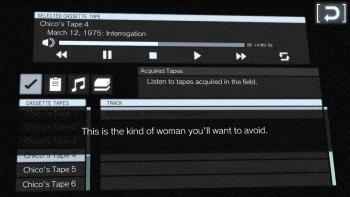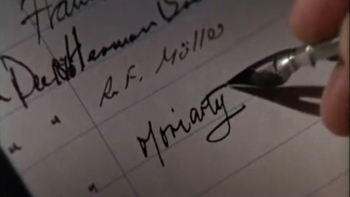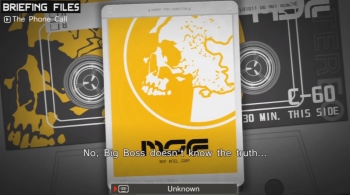Myth: Sexual assault is a reward in Ground Zeroes
 Video games are different from other forms of media and thus have unique ways to tell a story.
Video games are different from other forms of media and thus have unique ways to tell a story.Fact: Plot development, not the specifics of the plot, is the intended reward.
By Ravi Singh, Posted on April 10, 2014
NOTE: The following contains spoilers for Metal Gear Solid V: Ground Zeroes.
Most criticism of Metal Gear Solid V: Ground Zeroes has unfortunately been limited to how long the main mission takes to complete on the first attempt. This is then used to incorrectly conclude that the game is a demo or less than two-hours long. There is little on the subject of plot even though Metal Gear games since 1990’s Metal Gear 2: Solid Snake have been heavily plot-based. When plot is a subject of a review, opinions are seemingly mixed.
A growing trend among those with a negative view of the plot is criticizing the method of narrative in Ground Zeroes on the basis of its content. This is then used to argue that the player is “rewarded” with the actions depicted within the unlocked narrative.
“It’s a discordance made worse by clumsy, almost gleeful handling of the material. In one instance, rape is used as a reward in a side objective: those who are prepared to trawl through the map and collect all the hidden audio tapes will find one where they can listen to Paz being sexually assaulted before she is forced to copulate with the underage Chico. “It’s like fruit,” Skull Face muses in a bad guy growl. “Does she look sweet, or sour? A man has to know these things. Time for a taste test!”
Some reward.”
“And that isn’t even getting into the most disturbing part. Littered through the game are recordings from one of the two people you rescue. You get them by earning “S-ranks” on missions.
These recordings depict an audio rendition of the entire torture scenario from beginning to end (only the results of the torture are shown in the main mission, and the specifics are only hinted at).
So, essentially, the game is using recordings of a simulated torture session — including a horrendous sexual assault — as a prize for getting good at the game.
You can see the thought processes that brought series director Hideo Kojima to this point. Presumably, he was thinking something along the lines of “we need to show the what war is really about.”
But how it could have reached this end result without someone telling him what a horribly bad idea it was is, frankly, flooring.
A reward for skilled play should not be a radio play of a war rape. Period.”
Note: Kaszor is incorrect; none of the cassette tapes require an “S-Rank,” let alone any kind of ranking in general.
“Yes, the same publications that questioned the implied rape in Tomb Raider, who were disgusted by the torture scene and sexism in GTAV and raged about the oversized breasts in Dragon’s Crown, didn’t think it necessary to highlight the fact that a tape depicting rape is used as a reward for the completion of a mission in Ground Zeroes.
[…]
The length of the game is the main talking point, not the rape or child rape, not the fact that this is used as a reward, not the fact that there is no warning that this will happen. Every other detail of the game engulfs this miniscule, unimportant tape.”
It is one thing to criticize the plot, how sexual assault is depicted, the “twist” in the ending, Kojima’s weak writing of female characters or just about anything at all one takes issue with in general when it comes to Ground Zeroes. One can also criticize Ground Zeroes’ usage of “cassette tapes” to expand its story. An open discussion of these sort of things is necessary. To call the specific depiction of sexual assault a “reward” though completely ignores how non-linear video games provide their narrative.
 The most controversial of the tapes, “March 12, 1975: Interrogation,” is unlocked by rescuing a specific prisoner in the main mission.
The most controversial of the tapes, “March 12, 1975: Interrogation,” is unlocked by rescuing a specific prisoner in the main mission.Different forms of media use different ways to tell a story that involves some sort of activity from the audience. Literature requires reading. Visual novels and comics require reading and frame analysis. Radio plays and audiobooks require listening. Film and television require mostly viewing alongside listening and/or reading. Video games usually require a mixture of these things but also adds interaction as a requirement in some form.
“Interaction” is the important word here. In order for the plot to continue in a story-driven video game, one must continue playing, which may require tackling more difficult stages of interactive play. In a way the game does “reward” the player with more plot. Then again, a film “rewards” those who are willing to hold their bladder after drinking an unreasonable amount in the theater with more plot. Those who continue reading through chapters of a novel instead of slapping a bookmark in and getting some eye-rest are “rewarded” with a story. Video games are interactive by definition, so of course one must interact in some way for plot advancement if there is a story to be told. Outside of watching someone play through a game, one must usually “win” the game. Such is the nature of gaming.
To take a specific part of the plot and claim that the player is “rewarded” with that is misleading though. Is the player “rewarded” with an opportunity to shoot the final lethal bullet into an innocent woman in Metal Gear Solid 3: Snake Eater simply by finishing the final boss battle? Is one “rewarded” with Gray Fox’s death in Metal Gear Solid simply by advancing in the battle with Metal Gear REX? I guess anyone who gets far enough in Metal Gear Solid 2: Sons of Liberty will be “rewarded” with an attack on New York City eerily similar to the attack on the World Trade Center on September 11th, 2001. Of course, these are not rewards but rather the development of plot.
 The 1985 film Young Sherlock Holmes reveals the alter-ego of its main villain in a scene that plays immediately after the credits. The film requires the audience to continue watching past the “ending” much like how video games can require the audience further interaction for its narrative.
The 1985 film Young Sherlock Holmes reveals the alter-ego of its main villain in a scene that plays immediately after the credits. The film requires the audience to continue watching past the “ending” much like how video games can require the audience further interaction for its narrative.Ground Zeroes’ cassette tapes may seem like a different situation but only in the method of narrative. The plot in linear Metal Gear titles unfolds similarly to that of a lengthy film while Ground Zeroes continues Metal Gear Solid: Peace Walker’s method of non-linear storytelling with unlockable cassette tapes that expand the story. “Aha!” one may say, “Then the specific tape that depicts the sexual assault (Chico’s Tape #4) is a reward as it must be unlocked!” True, it must be unlocked, much like how all video game storytelling is “unlocked” by completing the game through interaction, or the post-credits scene of several films are, in a way, “unlocked” after watching through the credits.
The tapes simply expand on the narrative in a non-linear form that is only possible in video games. Only video games can push for further player interaction within the game for further plot development whereas other medium require more “passive” actions from the audience. By reading through Vladimir Nabokov’s novella Lolita one is “rewarded” by the advancement of the plot, not the specific ephebophilia and rape which play a role in the plot. Could some readers have actually found the themes in Lolita “rewarding”? Unfortunately, yes, but one cannot pin the author to the disturbed fetishes of a fraction of its audience, as this was not the intent. Similarly, one is rewarded with more of the plot in video games through interacting with it; the content of the plot including the torture, rape and other disturbing things is not intended to be the reward itself. With regards to Ground Zeroes, the tapes are rewards because they advance the plot. Listening to the audio that is available to play upon acquiring this “cassette tape” simply continues the narrative. The “reward” argument incorrectly links the interaction video game require for plot development to the content of the plot itself much like how fallacious it would be to suggest that Lolita readers are “rewarded” with the depraved actions of a man taking advantage of a young woman.
 A major plot twist in Peace Walker is revealed through a cassette tape that requires completion of every mission. Peace Walker, as a video game, is able to allow its story to unfold in this way.
A major plot twist in Peace Walker is revealed through a cassette tape that requires completion of every mission. Peace Walker, as a video game, is able to allow its story to unfold in this way.It goes back to the examples I have provided earlier where plot specifics are “rewards” if one is willing to make the jump in logic from plot development as a reward. Could it be argued that the method of unlocking the tapes is in bad taste due to their content? Certainly. Is it fair to argue that unlocking tapes is a poor means of storytelling, even in an interactive form of media? Yeah, if that is your opinion. In terms of the plot itself there definitely should be a discussion on the plot and themes of Ground Zeroes, including what is depicted on the tapes. I personally found the portrayal of sexual assault “meaningless” and “cheap.” To claim that the sexual assault depicted in the story is “a reward” however, is either being sensationalist or displaying ignorance of a means of narrative unique to video gaming.